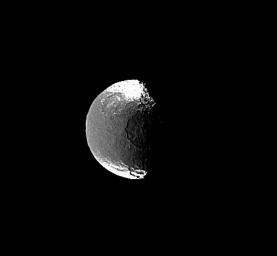
|
Details in the Dark
- Click the image above for a larger view
- Full-Res JPEG (471 x 436) (7.7 kB)
- Full-Res TIFF (471 x 436) (205.8 kB)
Caption:
This view shows one of the huge impact basins on the terminator of Saturn's moon Iapetus and a smaller, but still fairly large, crater near the southern bright-dark boundary. Just visible near the western limb, in the dark territory of Cassini Regio, is the moon's mysterious equatorial ridge. The ridge was discovered in Cassini images (see PIA06166 ) and reaches 20 kilometers (12 miles) high in places.
This view shows principally the leading hemisphere on Iapetus. North is up and tilted 15 degrees to the right. Iapetus is 1,468 kilometers (912 miles) across.
The image was taken with the Cassini spacecraft narrow-angle camera on March 19, 2005, through spectral filters sensitive to wavelengths of infrared light centered at 752 nanometers. The view was acquired at a distance of approximately 1.4 million kilometers (880,000 miles) from Iapetus and at a Sun-Iapetus-spacecraft, or phase, angle of 70 degrees. Resolution in the original image was 8 kilometers (5 miles) per pixel.
Background Info:
The Cassini-Huygens mission is a cooperative project of NASA, the European Space Agency and the Italian Space Agency. The Jet Propulsion Laboratory, a division of the California Institute of Technology in Pasadena, manages the mission for NASA's Science Mission Directorate, Washington, D.C. The Cassini orbiter and its two onboard cameras were designed, developed and assembled at JPL. The imaging team is based at the Space Science Institute, Boulder, Colo.
For more information about the Cassini-Huygens mission, visit http://saturn.jpl.nasa.gov and the Cassini imaging team home page, http://ciclops.org .
Cataloging Keywords:
| Name | Value | Additional Values |
|---|---|---|
| Target | Iapetus | |
| System | Saturn | |
| Target Type | Satellite | |
| Mission | Cassini-Huygens | |
| Instrument Host | Cassini Orbiter | |
| Host Type | Orbiter | |
| Instrument | Imaging Science Subsystem (ISS) | |
| Detector | Narrow Angle Camera | |
| Extra Keywords | Crater, Grayscale, Impact, Infrared, Visual | |
| Acquisition Date | ||
| Release Date | 2005-05-11 | |
| Date in Caption | 2005-03-19 | |
| Image Credit | NASA/JPL/Space Science Institute | |
| Source | photojournal.jpl.nasa.gov/catalog/PIA06646 | |
| Identifier | PIA06646 | |
